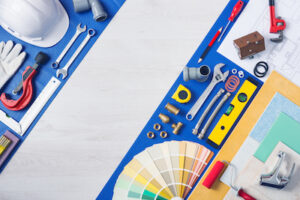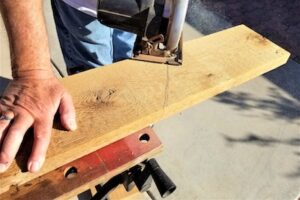Home Repairs 101: How to Master the Basics and Keep Your Home in Top Shape
Every homeowner knows that a well-maintained home is essential for both comfort and value. However, with the many responsibilities of daily life, it’s easy to let those small home repairs slide, only to find yourself with a growing list of issues that need to be addressed. Fear not! By mastering the basics of home repair, you can keep your home in top shape and tackle problems before they become costly headaches. So how do you master the basics of home repairs and keep your home in top shape?
The first step in how to master the basics of home repairs is to familiarize yourself with the most common issues that homeowners face. These typically include plumbing, electrical, painting, and carpentry repairs. This way you can keep your home in top shape.
By having a basic understanding of these areas, you’ll be better equipped to diagnose problems and determine whether you can handle them on your own or if it’s best to call in a professional. In this article, we’ll explore some simple yet essential home repair skills, as well as provide valuable insights and solutions to common household problems.

Plumbing Repairs
A basic understanding of your home’s plumbing system can save you from costly water damage and frustration. As it allows you to identify and fix minor plumbing problems before they turn into major ones such as water damage, mold, and more. This can save you a significant amount of money in the long run, as major plumbing issues can be costly to repair.
Start by learning how to fix a leaky faucet, unclog a drain, and replace a showerhead. Additionally, it’s essential to know how much a toilet installation costs in case you need to replace or upgrade your current one. These are common issues that can usually be resolved with a wrench, plunger, or some plumber‘s tape. Remember, when dealing with plumbing issues, it’s essential to turn off the water supply to avoid flooding. Especially, in the event of a plumbing emergency, such as a burst pipe or overflowing toilet, having some knowledge of how to shut off the water supply to your home can prevent further damage and potentially save you thousands of dollars in repairs.
Electrical Repairs
Electrical repairs can be intimidating, but learning the basics can help you safely tackle minor issues. Learn how to reset a circuit breaker, replace an outlet or light switch, and change a lightbulb. Keep in mind that working with electricity can be dangerous, so always turn off the power at the circuit breaker before attempting any electrical work. If you’re unsure about any aspect of electrical repairs, it’s best to consult with a professional electrician.
Painting
Knowing the basics of home painting repairs is important for several reasons. Firstly, it allows you to maintain the aesthetic appeal of your home and keep it looking fresh and new. Secondly, it can help you identify and fix minor painting issues before they turn into major ones, such as peeling or cracking paint. This can save you money in the long run, as major painting repairs can be costly. Thirdly, having some knowledge of painting repairs can be useful if you decide to do some DIY home improvement projects, as painting is often a key part of these projects. Overall, knowing the basics of home painting repairs can help you keep your home looking great and save you money in the process.
A fresh coat of paint can do wonders for your home’s appearance and overall atmosphere. To achieve professional-looking results, make sure you properly prepare the surface by cleaning, sanding, and priming as needed. Invest in high-quality paint and brushes, and use painter’s tape to achieve clean edges. Finally, be patient and allow the paint to dry fully between coats for a smooth, durable finish.
Carpentry Repairs
Basic carpentry skills are handy for tackling a range of home repairs, such as fixing a squeaky door, repairing damaged drywall, or replacing a broken fence post. Invest in a basic set of carpentry tools, including a hammer, saw, level, and drill. With practice and patience, you’ll be surprised at how many minor repairs you can manage on your own.

When It is Time to Call the Professionals
While mastering these basic home repair skills is essential, there will be times when it’s best to call in a professional, especially for specialized or more complex tasks. For example, if you notice damage to your roof, it’s crucial to consult with a reputable Roofing Contractor to assess the situation and provide the necessary repairs.
Maintenance
In addition to learning basic repair skills, it’s essential to establish a regular maintenance routine to keep your home in good condition and prevent costly repairs down the road. Here are some examples of basic home maintenance tasks that should be performed regularly:
1. Changing air filters and service the HVAC system: Replace your air filters at least every three months to ensure your HVAC system is running efficiently.
2. Cleaning gutters: Clean your gutters at least twice a year to prevent clogs and water damage to your home.
3. Checking smoke and carbon monoxide detectors: Test your carbon monoxide detectors monthly and replace batteries as needed.
4. Inspecting the roof for damage: Check for missing or damaged roof shingles and make repairs as needed.
5. Cleaning dryer vents: Clean your dryer vent at least once a year to prevent fire hazards and improve dryer efficiency.
6. Flushing the hot water heater: Flush your hot water heater annually to remove sediment and prolong its lifespan.
7. Sealing exterior cracks: Inspect your home’s exterior for cracks or gaps and seal them with caulk or weatherstripping.
8. Cleaning windows and screens: Clean your windows and screens regularly to improve indoor air quality and prevent damage.
9. Testing plumbing fixtures: Test your faucets and toilets regularly to identify leaks and make repairs as needed.
By performing these basic home maintenance tasks regularly, you can help prevent costly repairs and keep your home in good condition. Remember to assess your skill level and safety before attempting any home maintenance tasks and consider hiring a professional if you’re unsure.

In Closing
In conclusion, mastering the basics of home repair is a valuable skill set for any homeowner. By familiarizing yourself with common household issues and learning how to tackle them, you’ll save time, money, and frustration in the long run. And remember, when in doubt, don’t hesitate to consult with a professional for specialized or more complex repairs to ensure your home remains in top shape.
Finally, don’t be afraid to seek out resources to expand your home repair knowledge. There are numerous books, online tutorials, and even local workshops available to help you develop your skills and confidence. The more you learn, the better equipped you’ll be to handle whatever home repair challenges come your way.
By following these tips and mastering the basics of home repairs, you’ll not only maintain your home’s value and functionality but also gain a sense of accomplishment and pride in your abilities. So, roll up your sleeves, grab your tools, and get ready to conquer those home repairs!
